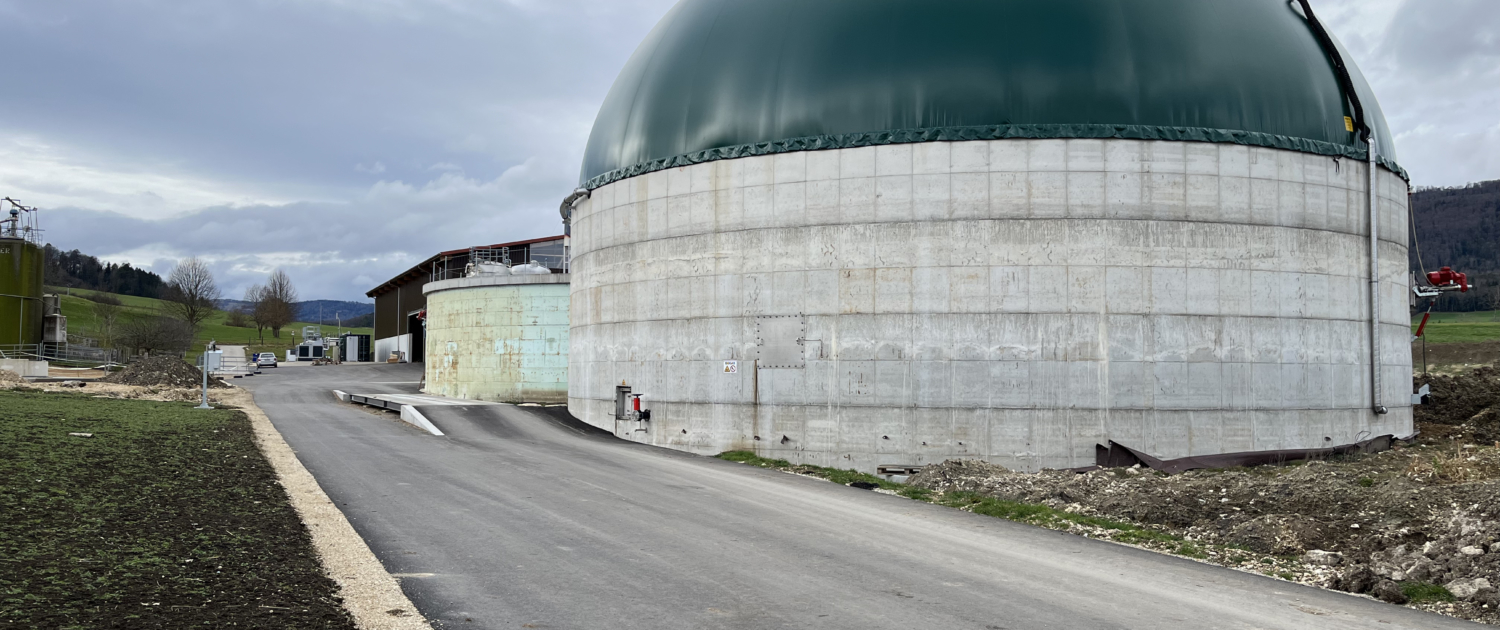A biogas plant to support the Jura gas network
Courtemelon in the canton of Jura is home to the Inter-Jurassic School of Agriculture and a large organic farm. A biogas plant with an even more unusual vision has recently been installed. It produces biomethane for injection into the Delémont valley gas network. The plant has been in operation since January 17, and is the first agricultural facility in French-speaking Switzerland to operate in this way. Only one other agricultural plant produces biomethane in Switzerland, and it's in the Rheintal. The other agricultural biogas plants produce mainly electricity and heat.
The Courtemelon project began in 2011 with various partners, before three farmers decided to embark on the adventure alone in 2016 to diversify their farms. After a first project to produce electricity failed to win a contract under the feed-in remuneration system (formerly RPC), they didn't give up, and set to work again in 2019 with a project to produce biomethane for injection. Together, they have found 4 private partners (Syndicat de gestion des déchets de Delémont et environs, Energie du Jura, Ökostrom Schweiz and Association Suisse de l'Industrie Gazière) ready to support a quarter of the investment of around 8 million francs, with the remainder to be raised by themselves. To ensure the sustainability of the project, they were able to secure a guaranteed price for biomethane injection with the local supplier. The building permit was approved in June 2022, 15 months later the filling of the tanks began (November 2023), and the plant has now been up and running for just over a month and a half.
The plant is expected to produce 8 to 9 GWh of gas per year, covering around 10% of the Delémont Valley's consumption. To maintain production, around 60 m3 of material per day must be incorporated into the system, which also represents a logistical challenge in terms of stock management in the storage hall. To feed the digesters, 10 to 15 farms can deliver their slurry and manure (equivalent to 800 livestock units), and some of the valley's green waste is brought to Courtemelon. All this adds up to the 20,000m3 required per year to keep the plant running smoothly. The advantage of processing farmyard manure in a biogas plant is that it avoids the emission of 800t of CO2 per year into the atmosphere. Various ideas are already germinating in the minds of operators to further reduce CO2 emissions. The "digestion" waste that comes out of the plant, which resembles fine compost, can be used to fertilize the crop soils of the various farmers who supply the plant.
Energeiaplus met with Vincent Boillat, manager of Ecobioval sàrl, whose family owns the Courtemelon farm next to the plant:
https://youtu.be/fgTXkDGn1wU
An open day for the Ecobioval power plant will be held on Saturday March 23, 2024 in Courtemelon from 08:00 to 18:00. For more information, click here.
Fabien Lüthi, communication Swiss Federal Office of Energy
Images and video: SFOE
 OFEN
OFEN
 BFE - Brigitte MaderBFE-Wettbewerb an den Powertagen: Solarbag für den Netzelektriker
BFE - Brigitte MaderBFE-Wettbewerb an den Powertagen: Solarbag für den Netzelektriker  Winterpause bis 3. Januar 2023
Winterpause bis 3. Januar 2023  Benedikt VogelGeoenergie aus sicheren Felszonen
Benedikt VogelGeoenergie aus sicheren Felszonen 
 Shutterstock 288462527
Shutterstock 288462527 BFE - Brigitte Mader
BFE - Brigitte Mader
Neuste Kommentare